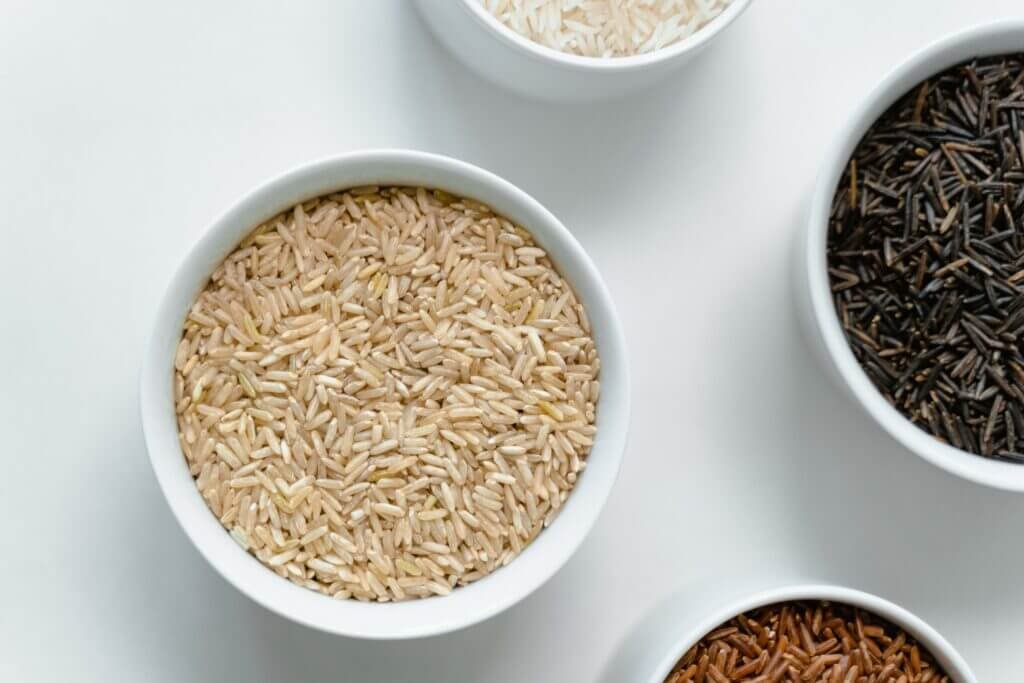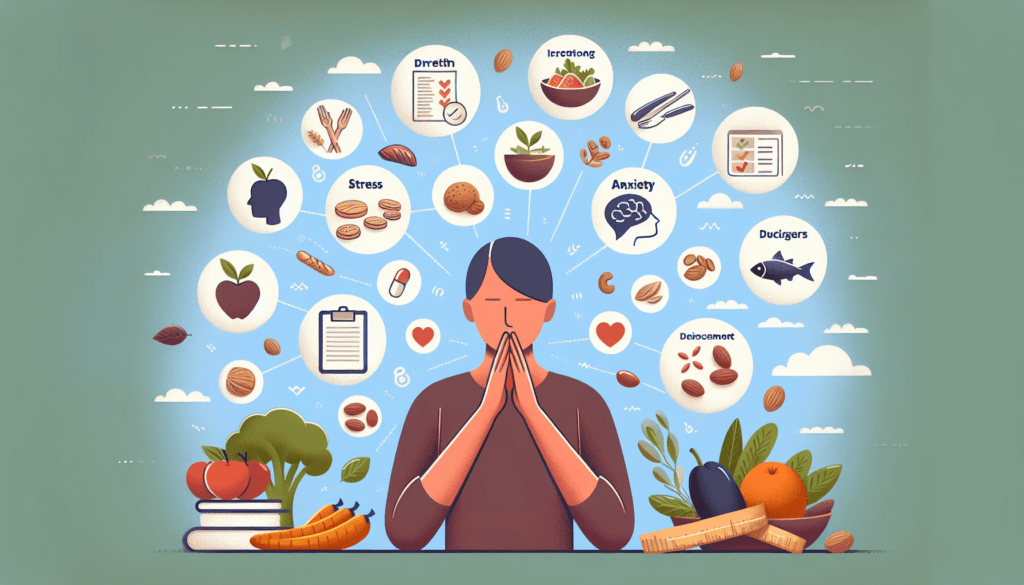Are you a boomer who is looking for ways to manage stress and anxiety? Look no further, as this article will provide you with dietary tips that can help you tackle these issues head-on. By incorporating certain foods into your diet, you can not only improve your overall well-being but also find relief from the pressures of daily life. So, grab a pen and paper and get ready to discover the secrets to a stress-free and anxiety-free life through your diet.
Benefits of a Healthy Diet for Boomers
Maintaining a healthy diet is essential for all age groups, but it becomes even more crucial as we enter our golden years. As a boomer, taking care of your physical and mental health should be a top priority. Fortunately, following a healthy diet has numerous benefits that can significantly contribute to your overall well-being.
Reduced stress and anxiety
One of the key benefits of a healthy diet for boomers is the reduction of stress and anxiety. Your body relies on certain nutrients and vitamins to regulate stress hormones and promote relaxation. By incorporating specific foods into your diet, you can help alleviate these feelings of stress and anxiety, allowing you to enjoy a more balanced and peaceful life.
Improved mood and well-being
A healthy diet can have a profound impact on your mood and overall sense of well-being. Certain nutrients found in food can enhance the production of serotonin, a neurotransmitter that contributes to feelings of happiness and contentment. By fueling your body with the right foods, you can boost your mood, creating a positive outlook on life.
Enhanced cognitive function
Maintaining cognitive function is especially important as we age. A healthy diet rich in essential nutrients can significantly improve brain health and enhance cognitive function. By nourishing your brain with the right foods, you can support memory, attention, and concentration, allowing you to stay sharp and focused well into your golden years.
Essential Nutrients for Stress and Anxiety Management
When it comes to managing stress and anxiety, incorporating certain essential nutrients into your diet can make a world of difference. These nutrients have been shown to have calming and stabilizing effects on the body, helping to reduce stress levels and promote relaxation.
Omega-3 fatty acids
Omega-3 fatty acids, commonly found in fatty fish such as salmon and sardines, have been shown to have significant benefits for stress management. These healthy fats help reduce inflammation in the body and support brain health, contributing to a calmer mind and improved mood.
Vitamin B complex
The B vitamins play a crucial role in maintaining a healthy nervous system and producing neurotransmitters that regulate mood. Including foods rich in vitamin B complex, such as whole grains, leafy greens, and lean meats, can help alleviate stress and anxiety symptoms.
Magnesium
Magnesium is a mineral that acts as a natural relaxant for both the body and mind. It plays a vital role in regulating the body’s stress response and promoting a sense of calmness. Foods high in magnesium, such as nuts, leafy greens, and legumes, can help reduce stress and anxiety levels.
Probiotics
Your gut health is closely linked to your mental well-being, which is why incorporating probiotics into your diet is essential for stress and anxiety management. Probiotics, found in fermented foods like yogurt, sauerkraut, and kimchi, help maintain a healthy gut flora, which positively impacts mood and reduces anxiety.

Foods to Include in the Diet
To reap the benefits of a healthy diet, it’s important to know which foods to include. By incorporating these foods into your daily meals, you can nourish your body and promote overall well-being.
Fatty fish
Fatty fish like salmon, mackerel, and trout are excellent sources of omega-3 fatty acids. These healthy fats support brain health, reduce inflammation, and promote a calm mind. Aim to include fish in your diet at least twice a week to enjoy the benefits.
Leafy greens
Leafy greens such as spinach, kale, and Swiss chard are packed with essential nutrients like magnesium, folate, and vitamin B complex. These nutrients contribute to stress reduction and overall mood improvement. Incorporate leafy greens into your salads, smoothies, or sautés for a nutritious boost.
Nuts and seeds
Nuts and seeds, such as almonds, walnuts, and flaxseeds, are great sources of healthy fats, magnesium, and vitamin E. These nutrients help combat stress and promote relaxation. Snack on a handful of nuts or sprinkle them onto your salads or yogurt for added crunch and health benefits.
Whole grains
Whole grains like quinoa, brown rice, and oats are rich in fiber and B vitamins, contributing to stress reduction and improved mood. Replace refined grains with whole grains in your meals to enjoy sustained energy levels and better mental well-being.
Fermented foods
Fermented foods like yogurt, sauerkraut, and kimchi are natural sources of probiotics that promote gut health and a healthy mind. Incorporate these foods into your meals or enjoy them as a side to support your overall well-being.
Effects of Caffeine and Alcohol
While a healthy diet is beneficial for stress and anxiety management, it’s important to be mindful of the effects of certain substances, such as caffeine and alcohol, on your mental state.
Limit caffeine intake
Caffeine, commonly found in coffee, tea, and energy drinks, is a stimulant that can increase feelings of anxiety and contribute to elevated stress levels. It’s best to limit your caffeine intake or opt for decaf alternatives to promote a calmer state of mind.
Drink alcohol in moderation
While alcohol may temporarily provide a sense of relaxation, excessive consumption can lead to increased anxiety and disrupted sleep patterns. It’s important to drink alcohol in moderation and be aware of its potential negative effects on your mental well-being.

Balancing Blood Sugar Levels
Maintaining stable blood sugar levels is crucial for overall well-being, including stress and anxiety management. By adopting certain dietary habits, you can promote balanced blood sugar levels throughout the day.
Avoid processed foods
Processed foods, such as white bread, sugary snacks, and sodas, can cause rapid spikes and drops in blood sugar levels, leading to mood swings and increased stress. Opt for whole, unprocessed foods that provide sustained energy and stabilize blood sugar levels.
Choose complex carbohydrates
Complex carbohydrates, found in whole grains, legumes, and vegetables, are digested slowly, providing a steady release of glucose into the bloodstream. This helps maintain stable blood sugar levels and promotes a stable mood throughout the day.
Include protein in every meal
Incorporating protein-rich foods into each meal helps slow down the digestion process, preventing rapid blood sugar spikes. Lean meats, fish, beans, and tofu are excellent sources of protein that can help stabilize blood sugar levels and promote a sense of calmness.
The Role of Hydration
Staying properly hydrated is often overlooked when it comes to managing stress and anxiety. However, dehydration can exacerbate these conditions and negatively impact your overall well-being. Make hydration a priority and experience the positive effects it can have on your mental state.
Drink enough water
Water is essential for maintaining optimal bodily functions, including brain health. Dehydration can lead to increased stress, fatigue, and poor cognitive function. Aim to drink at least eight glasses of water a day to stay properly hydrated and support your mental well-being.
Reduce sugary beverages
Sugary beverages, such as soda and fruit juices, can lead to blood sugar spikes and crashes, contributing to mood swings and increased stress levels. Opt for water, herbal teas, or infused water to stay hydrated without the negative effects of excess sugar.
Include herbal teas
Certain herbal teas, such as chamomile, lavender, and green tea, have calming properties that can help reduce stress and anxiety. Incorporate these teas into your daily routine and enjoy the soothing benefits they provide.

The Importance of Regular Meals
Establishing regular meal times and practicing mindful eating can have a significant impact on your overall well-being, including stress and anxiety management.
Have structured meal times
Eating at regular intervals throughout the day helps maintain stable blood sugar levels and prevents energy crashes. Aim to have three balanced meals and incorporate healthy snacks in between to provide sustained energy and support mental well-being.
Include a variety of nutrients
Each meal should consist of a balance of macronutrients and include a variety of colorful fruits and vegetables. This ensures that your body receives essential nutrients for optimal brain function and mood regulation.
Avoid skipping meals
Skipping meals can lead to blood sugar imbalances, increased stress, and a lack of energy. It’s important to prioritize regular meals and listen to your body’s hunger cues to provide it with the fuel it needs to function optimally.
Mindful Eating and Stress Reduction
Adopting a mindful eating practice can significantly contribute to stress reduction and overall well-being. By being fully present and intentional while eating, you can cultivate a healthier relationship with food and enhance your mental state.
Slow down and savor meals
Take the time to slow down and fully enjoy your meals. Eating slowly allows your body to properly digest the food and can help reduce stress levels. Focus on the flavors, textures, and aromas of your food, savoring each bite.
Be present while eating
Avoid distractions while eating, such as watching TV or scrolling through your phone. Instead, focus on the act of eating and pay attention to your body’s hunger and fullness cues. Being present during meals promotes mindful eating and can contribute to stress reduction.
Avoid emotional eating
Many boomers turn to food as a coping mechanism for stress and anxiety. However, emotional eating can lead to an unhealthy relationship with food and exacerbate negative emotions. Instead of using food to cope, explore other stress-reducing activities such as meditation, exercise, or spending time in nature.

The Impact of Sugar and Processed Foods
The consumption of sugar and processed foods has become increasingly prevalent in our modern diet, contributing to various health issues, including stress and anxiety. By being mindful of your sugar and processed food intake, you can make significant improvements to your overall well-being.
Reduce refined sugar consumption
Refined sugars found in desserts, pastries, and sweetened beverages can lead to blood sugar imbalances and increased stress levels. Limit your consumption of these sugary treats, opting for natural sweeteners or fruits to satisfy your sweet tooth.
Avoid processed and packaged foods
Processed and packaged foods often contain high amounts of sodium, unhealthy fats, and artificial additives. These can disrupt your body’s natural balance and contribute to mood swings and increased stress. Instead, focus on consuming whole, unprocessed foods that provide nourishment and support overall well-being.
Choose wholesome alternatives
Swap out processed snacks and pre-packaged meals with wholesome alternatives. Opt for fresh fruits and vegetables, homemade meals, and snacks like nuts and seeds. These alternatives not only support your physical health but also contribute to stress reduction and improved mental well-being.
Summary and Conclusion
In conclusion, adopting a healthy diet can have numerous benefits for boomers, especially in managing stress and anxiety. By including essential nutrients such as omega-3 fatty acids, vitamin B complex, magnesium, and probiotics in your diet, you can support your mental well-being. Incorporating foods like fatty fish, leafy greens, nuts and seeds, whole grains, and fermented foods can nourish your body and promote overall health. It’s also important to be mindful of the effects of caffeine and alcohol, balance blood sugar levels, stay hydrated, prioritize regular meals, practice mindful eating, and minimize the consumption of sugar and processed foods. By taking these dietary tips into consideration, you can experience the positive effects of a healthy diet on your well-being as a boomer. Remember, your health is in your hands, and making conscious choices can lead to a happier, healthier, and more fulfilled life.



